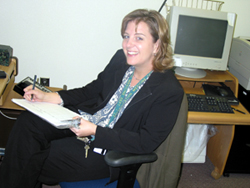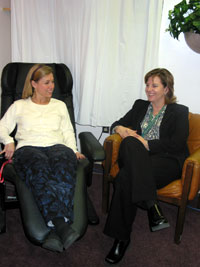 |
 |

|
|
Julie Hoehl, CTRS, Recreational Therapist, Clinical Center, Rehabilitation Medicine Department, National Institutes of Health, Bethesda, Maryland
|
1. I chose this career because…
2. My typical work day involves…
3. What I like best and least about my work is…
4. My career goals are…
5. When I’m not working, I like to…
|
|
1. I chose this career because…
|
Back to Top

|
I chose to become a recreational therapist because this branch of therapy deals with “the whole person.” For each patient, we assess six functional domains:
- Physical – gross and fine motor skills, fatigue, strength, pain and how that impacts their leisure and lifestyle
- Cognitive –mental fatigue, concentration, decision making, memory, orientation and how that impacts their leisure and lifestyle
- Emotional –display of emotion, affect, mood, and frustration tolerance
- Social –interaction skill, group skills, and social support
- Behavioral –exercise routine, appearance, and level of involvement in treatment
- Leisure and Play –leisure awareness, and leisure involvement
Early Influences
When I was in fifth grade, my mother worked as a school aide. One of her tasks was to assist a student who had cerebral palsy. I learned how important it is to help others.
I used to be a babysitter for a physical therapist. She had a private practice in her home, and I watched her kids while she worked. I observed the positive impact she made on her patients, and started to consider this type of career for myself.
In high school, I spent half a day in school, and half a day in college. I had Tuesday, Thursday, and Friday afternoons free. With this free time, my parents gave me two choices: do volunteer work for the community, or work in a paying job. I chose volunteer work at a rehabilitation center, assisting physical, occupational, and speech therapists. Each of these specialties is unique, yet focusing primarily on one aspect of an individual. I preferred a field with a more holistic approach. At a college orientation, I learned about recreation therapy. This program was just right for me.
Education/Certification
- Bachelor of Science degree – Recreation and Leisure Services with a concentration in Therapeutic Recreation, Radford University, Radford, Virginia
- Internship with the Department of Rehabilitation Medicine, NIH, Bethesda, Maryland
- Passed certification exam – Certified Therapeutic Recreational Specialists (CTRS)
- Certification as a personal trainer
Career
- Children’s Hospital, New Orleans
- Rehabilitation Medicine Department, NIH, Bethesda, Maryland
|
|
2. My typical work day involves…
|
Back to Top

|

|
|
Julie with patient using the vibroacoustic recliner
|
My typical workday revolves around the patient’s and their needs. My major tasks include:
- Clinical assessments – with patient and physician to determine intervention plan
- Family-centered care – meeting with family and caregivers (consider stress and coping)
- Bedside intervention – guided bedside exercise and relaxation for patients
- Pain clinic – once-a-week clinic to reduce patient’s pain and discomfort
Intervention plans may include any of the following from me or other therapists in my section:
· Massage
· Rikki therapy
· Relaxation
· Acupuncture
· Spiritual guidance
· Exercise
· Nutritional advice
· Other activities such as crafts, games
My workday settings are:
· My office
· Patient’s bedside
· Relaxation room
· Gym
· Craft and play rooms
Aides and equipment I use in my work includes:
· Vibroacoustic Recliners – to allow patients to relax into musical sounds and vibrations
· Music – to support relaxation and serve as pleasant background sounds
· Weights and gym equipment – to promote exercise as part of a healthy lifestyle
Sometimes I speak about various aspects of my specialty at:
· Rehabilitation grand rounds – a meeting of professionals in the field
· Oncology nursing society meetings – on cancer-related fatigue
· State parks and recreation associations
· Health fairs
|
|
|
 |